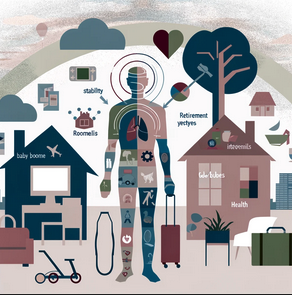Anatomy of a Baby Boomer Renter
Anatomy of a Baby Boomer Renter
As the Baby Boomer generation continues to redefine the rental market, it’s essential to understand the anatomy of a Baby Boomer renter. Who are these Baby Boomers, and what characteristics define them? Why do they choose to rent instead of owning a home, and how has the housing market influenced their decisions?
In this article, we will explore the benefits and challenges of renting for Baby Boomers, how they choose a rental property, and the emerging trends in Baby Boomer renting. Let’s dive into the world of Baby Boomer renters and explore their unique preferences and needs in today’s rental market.


Anatomy of a Baby Boomer Renter
Understanding the anatomy of a Baby Boomer renter involves delving into the unique characteristics and preferences of this demographic group within the housing market. Baby Boomers, born between 1946 and 1964, have a significant impact on rental trends and housing solutions due to their aging population and lifestyle choices.
As Baby Boomers transition into retirement or empty nesting phases, many are opting for the flexibility and convenience that renting provides. They are attracted to amenities such as maintenance-free living, community activities, and proximity to healthcare services. This generation values experiences and quality of life over the traditional notion of homeownership, leading to a shift in the rental market. Baby Boomers also seek rental properties with accessibility features and proximity to social amenities, shaping the demand for senior-friendly housing options.
Who Are Baby Boomers?
Baby Boomers are individuals born between 1946 and 1964, making them a significant demographic cohort within the aging population of the United States. Their characteristics, lifestyle choices, and economic impact shape various aspects of society and the housing market.
As Baby Boomers continue to age, there is a growing focus on their retirement planning and housing preferences. This generation’s sheer size has led to an increased demand for retirement communities, age-restricted housing, and accessible amenities. Their influence extends beyond their own needs, impacting market dynamics and shaping the construction and design of housing options. Due to their retirement age approaching or already reached, Baby Boomers hold substantial assets, making them a crucial segment for financial planners and real estate developers to consider.
What Are the Characteristics of Baby Boomers?
Baby Boomers exhibit unique characteristics that define their housing preferences, lifestyle choices, and social trends. Understanding these traits is crucial for analyzing their impact on the rental market and urban development.
- They are a generation known for valuing stability, comfort, and quality in their living spaces. Baby Boomers tend to prioritize homeownership, desiring properties that offer ample space for their belongings and activities. Many seek homes with convenience and accessibility features as they age, such as single-story layouts and walk-in showers.
- This generation also values community engagement, often looking for neighborhoods with active social scenes and opportunities for networking and socializing. Their preferences influence not only the housing market’s supply and demand dynamics but also drive the need for age-friendly infrastructure and services.
Why Do Baby Boomers Choose to Rent?
The decision of Baby Boomers to choose renting over home ownership is influenced by various factors within the housing market. Understanding the rental trends and financial implications aids in comprehending their preferences.
One key reason for this shift towards renting among Baby Boomers is the flexibility it offers in terms of mobility. Renting allows them to easily explore different locations without being tied down to a specific property. The maintenance responsibilities associated with homeownership can be a burden for older individuals looking to simplify their lives. Factors like rising property taxes, fluctuating home prices, and potential market instability have also contributed to Baby Boomers opting for the rental option, providing them with a more predictable and manageable housing cost.
What Are the Reasons for Renting Instead of Owning a Home?
Baby Boomers opt for renting instead of owning a home due to their evolving housing preferences, lifestyle choices, and considerations for retirement planning. These factors influence their decision-making in the real estate market.
They value the flexibility and freedom that renting offers, allowing them to easily explore different living arrangements without being tied down to a long-term mortgage. Renting also relieves them of the burdens of property maintenance and repairs, giving them more time to focus on enjoying their retirement years.
Renting provides Baby Boomers with the opportunity to downsize or upsize as needed, adapting their living space to suit their changing needs. This rental trend among Baby Boomers reflects a shift towards a more practical and flexible approach to housing in their later stages of life.
How Has the Housing Market Affected Baby Boomers’ Decisions to Rent?
The dynamics of the housing market play a pivotal role in shaping Baby Boomers’ decisions to rent, impacting their choices based on rental trends, population dynamics, and the economic implications of homeownership versus renting.
For Baby Boomers, rental trends such as the increasing popularity of luxury apartment complexes with amenities tailored to their preferences often sway their decision towards renting instead of owning. As Baby Boomers retire or downsize, population dynamics come into play, with many opting for the flexibility and reduced maintenance responsibilities that renting offers. Economic factors, such as fluctuating property values and potential maintenance costs, also influence Baby Boomers to choose renting as a more financially stable option in certain markets.
What Are the Benefits of Renting for Baby Boomers?
Renting offers several advantages for Baby Boomers seeking senior living arrangements that align with their lifestyle choices. Understanding the benefits of renting helps cater to their preferences in the housing market.
Senior living communities often offer amenities such as 24-hour security, maintenance services, and recreational facilities, all contributing to a stress-free lifestyle for Baby Boomers. Rental properties provide flexibility for those who may desire to travel frequently or downsize without the responsibilities of homeownership. With rental options ranging from apartments to single-family homes, Baby Boomers can find accommodations that suit their specific needs and preferences, promoting a comfortable and tailored living experience.
Flexibility and Mobility
One of the key benefits of renting for Baby Boomers is the flexibility and mobility it offers, allowing them to explore different rental properties that cater to their accessibility needs and lifestyle choices.
This generation values the ability to adapt to changing circumstances and preferences, and renting provides them with the freedom to do so without the commitments of homeownership.
Baby Boomers often seek rental properties in age-restricted communities or those with amenities like elevators, grab bars, and wide doorways to accommodate their evolving mobility requirements.
The sense of community fostered in many rental complexes also aligns with their desire for social connections and shared experiences, making renting an attractive housing solution for Baby Boomers looking to maintain an active and engaged lifestyle.
Lower Maintenance and Expenses
Renting provides Baby Boomers with the advantage of lower maintenance and expenses compared to homeownership, reducing financial burdens related to property maintenance and adhering to rental agreements.
This cost-saving benefit allows Baby Boomers to allocate their finances towards other priorities, such as travel, hobbies, or retirement savings. By renting, they avoid the hefty costs associated with repairs, property taxes, and homeowners insurance that come with owning a home.
Rental agreements provide a sense of security and stability, outlining clear terms for rent payments, maintenance responsibilities, and potential lease renewals. This transparent communication can help Baby Boomers better manage their budgets and plan for their future with peace of mind.
Access to Amenities and Services
Renting offers Baby Boomers access to a range of amenities and services that cater to their senior living needs, providing assistance, maintenance, and improved housing conditions for a comfortable lifestyle.
These rental communities often feature amenities such as fitness centers, community gathering spaces, and transportation services, which promote social interaction and active living. Many rental assistance programs are available to help offset costs and ensure financial security for Baby Boomers seeking a stress-free living arrangement. The housing options vary from independent living apartments to assisted living facilities, catering to different levels of care and support based on the individual’s needs and preferences.
What Are the Challenges of Renting for Baby Boomers?
While renting offers benefits, Baby Boomers face challenges such as navigating rental regulations, managing property maintenance, balancing lifestyle choices, and dealing with fluctuating rental costs.
As Baby Boomers transition from homeownership to renting, they often encounter difficulties related to limited control over property modifications and restrictions concerning pet ownership. The adjustment to communal living in rental complexes can pose social challenges for this demographic accustomed to a more private lifestyle. Financial considerations also play a crucial role, with rental costs impacting retirement savings and long-term financial stability for many Baby Boomers.
Limited Control over Living Space
One challenge Baby Boomers face while renting is the limited control over their living space, as they navigate rental agreements, housing accessibility, lifestyle choices, and associated rental costs.
This lack of control presents significant hurdles for Baby Boomers looking to create a truly personalized living environment. Rental agreements often restrict modifications, limiting the ability to tailor the space to their individual needs and preferences.
Housing accessibility constraints can make it challenging for them to find suitable accommodations that cater to their specific requirements, such as accessibility features for aging individuals. Lifestyle preferences also play a crucial role, as many Baby Boomers desire communities that offer social activities and amenities tailored to their age group.
The consideration of rental costs adds another layer of complexity, with affordability becoming a key factor in their decision-making process.

Potential for Rent Increases
Another challenge for Baby Boomers renting properties is the potential for rent increases, impacting their financial stability, economic decisions, and potential eligibility for rental assistance programs.
These rent escalations can put added strain on retirees who are living on fixed incomes, as the increased financial burden may force them to make difficult choices between essential expenses like healthcare and maintaining their housing.
With rising rental rates, Baby Boomers may also face challenges in saving for retirement or accessing affordable housing options.
Some communities offer rental assistance programs that can provide relief for older adults struggling with escalating rental costs, helping them maintain stable housing situations despite the economic pressures they face.
Lack of Long-Term Stability
The lack of long-term stability in rental arrangements poses a challenge for Baby Boomers, who seek reliable housing options amidst concerns about rental vacancies, housing solutions, lifestyle choices, and effective property management.
This demographic group, known for its preference for secure and comfortable living situations, finds itself navigating a rental landscape that often lacks the permanence they desire. With fluctuating rental vacancies and limited affordable housing options tailored to their specific needs, Baby Boomers face the dilemma of maintaining a stable lifestyle. Property management plays a crucial role in mitigating these challenges by offering services that cater to the maintenance and upkeep of rental properties, ensuring a comfortable and worry-free living environment for this generation.
How Do Baby Boomers Choose a Rental Property?
The selection process for Baby Boomer renters involves critical considerations such as location, affordability, amenities, and safety, reflecting their housing preferences and the evolving dynamics of the rental market.
They prioritize proximity to essential services and recreational facilities, favoring neighborhoods with easy access to parks, shopping centers, and healthcare providers. Baby Boomers often seek rental properties that offer maintenance services and security features, providing them with added peace of mind. These factors not only influence individual rental decisions but also play a significant role in shaping the overall landscape of urban development, as property managers and real estate developers respond to the demands of this demographic segment.”
Location and Community
Baby Boomers prioritize location and community aspects when selecting a rental property, considering housing options that meet their community needs, access to services, and alignment with prevailing social trends.
They often seek rental properties situated in areas that offer convenient access to medical facilities, recreational amenities, and public transportation.
Community requirements may include proximity to social gatherings, fitness centers, and cultural activities that cater to their lifestyle preferences.
Baby Boomers value rental communities that promote a sense of belonging and connection through organized events and social interactions.
Trends such as co-living and intergenerational housing are gaining popularity among this demographic, shaping their rental choices towards more communal living settings.
Affordability and Amenities
Affordability and amenities play a crucial role in Baby Boomers’ rental property choices as they balance rental costs, lifestyle preferences, and the availability of amenities along with potential assistance programs.
Concerns about housing conditions and financial implications further underscore the significance of finding a rental property that not only fits within their budget but also offers the necessary amenities to support their desired lifestyle.
Factors such as proximity to healthcare facilities, recreational areas, and social activities often influence their decision-making process.
The availability of rental assistance programs can significantly impact their ability to choose a suitable living arrangement that meets both their financial constraints and lifestyle expectations.
Accessibility and Safety
Accessibility and safety are key factors Baby Boomers consider when choosing a rental property, ensuring housing accessibility, safety measures, alignment with lifestyle choices, and the benefits of the rental arrangement.
For Baby Boomers, having a rental property that caters to their specific needs is paramount. Features like grab bars in bathrooms, wide doorways for easy mobility, and well-lit pathways are crucial considerations. Safety measures such as smoke detectors, secure locks, and emergency response systems provide peace of mind. Lifestyle considerations play a significant role, with amenities like community centers, fitness facilities, and proximity to healthcare services being highly valued. These factors collectively contribute to a comfortable and secure living environment for Baby Boomers in their chosen rental property.
What Are the Trends in Baby Boomer Renting?
The trends in Baby Boomer renting showcase an increase in rental demand, a shift towards luxury rentals, and a focus on accessibility and aging-in-place features, reflecting their evolving lifestyle choices and generational shift toward rental preferences.
This rise in rental demand among Baby Boomers can be attributed to various factors, including a desire for flexibility and freedom from homeownership responsibilities. As this generation enters retirement, many Baby Boomers are opting for luxurious rental properties that offer resort-style amenities and upscale finishes, catering to their desire for comfort and convenience. The emphasis on accessibility and aging-in-place features in rental units allows Baby Boomers to maintain independence and enhance their quality of life as they age gracefully.
Increase in Baby Boomer Renters
There is a noticeable increase in Baby Boomer renters due to shifting population dynamics, evolving social trends, and the adaptation of rental policies to cater to the preferences of senior citizens in the housing market.
- As Baby Boomers reach retirement age, many are choosing to downsize from their family homes and embrace the convenience and flexibility of renting. This trend is also driven by the desire for a maintenance-free lifestyle and the opportunity to live in communities with amenities tailored to their needs.
- Changes in pension plans and financial circumstances have made renting a more feasible option for some seniors. Policy changes that focus on housing affordability and accessibility for older adults have further encouraged this demographic shift toward renting.
Shift towards Luxury Rentals
Baby Boomers are increasingly gravitating towards luxury rentals, seeking sophisticated living arrangements that cater to their lifestyle choices, offer premium rental benefits, and maintain high-quality housing conditions.
Their considerations for rental agreements often include amenities such as concierge services, fitness centers, and communal spaces for socializing.
Lifestyle preferences play a significant role as they desire upscale surroundings that reflect their taste and status.
The benefits of these upscale rentals go beyond the physical space, encompassing a sense of community, security, and convenience.
For Baby Boomers, the importance of housing conditions cannot be overstated, with a focus on comfort, safety, and maintenance provided by professional management.
Emphasis on Accessibility and Aging-in-Place Features
Baby Boomers place a strong emphasis on accessibility and aging-in-place features when selecting rental properties, leveraging rental assistance programs, and exploring housing options that cater to their evolving needs and community requirements.
They prioritize living spaces that are easily navigable and equipped with key amenities that promote independence and comfort. Housing solutions such as single-story homes, grab bars in bathrooms, wider doorways, and ramps are among the sought-after features. They seek out rental benefits like reduced rent through government programs that support seniors staying in their homes longer. Community-centric needs, from proximity to healthcare facilities to social engagement opportunities, play a crucial role in their decision-making process.